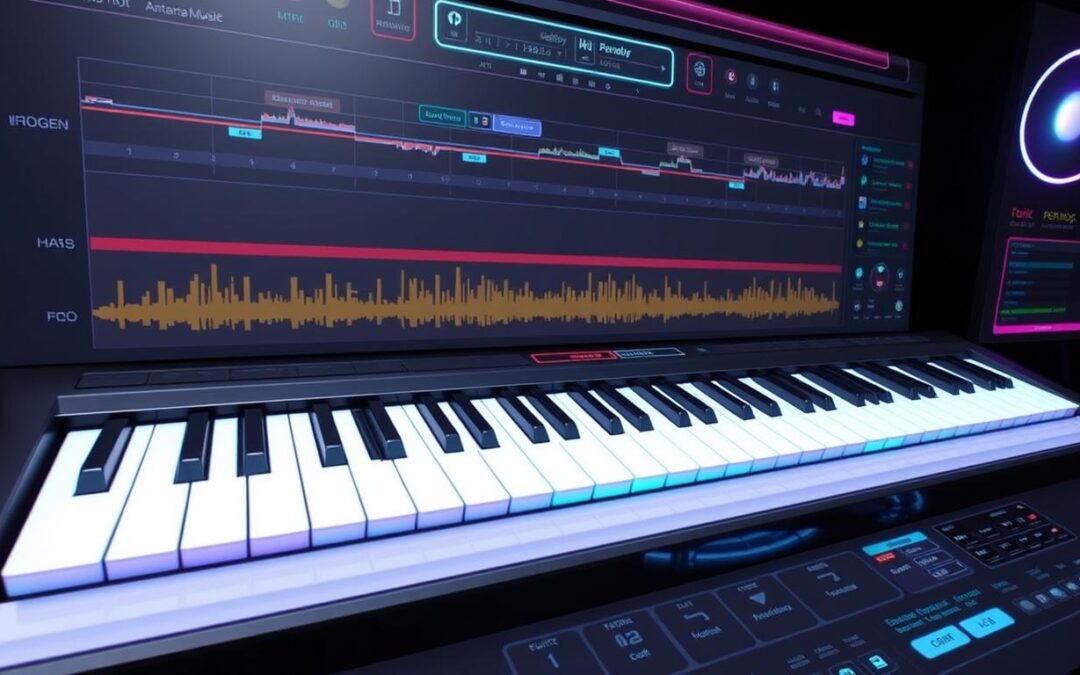The music industry is experiencing a profound transformation with the rise of AI music generators. These innovative tools are changing how we create, produce, and experience music in ways previously unimaginable. Whether you’re a professional musician looking to enhance your workflow, a content creator seeking original background tracks, or simply curious about making music without formal training, AI music generators offer exciting possibilities for everyone.
What Are AI Music Generators and How Do They Work?
AI music generators are sophisticated software applications that use artificial intelligence to compose, arrange, and produce original music. Unlike traditional music production tools that require extensive knowledge of music theory and composition, these AI-powered systems can create complete musical pieces from simple text prompts or parameters.
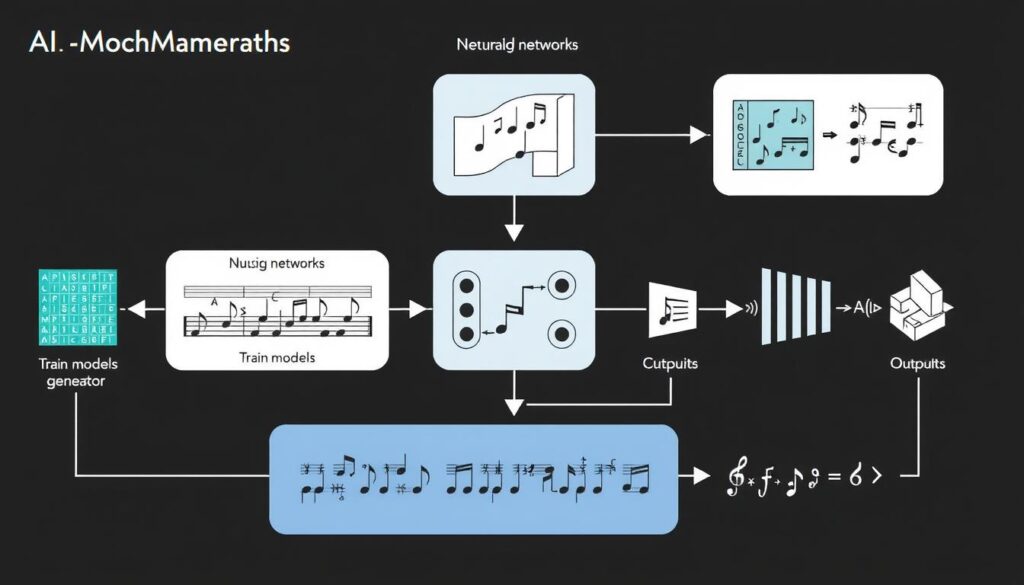
Machine Learning Models
At the core of AI music generators are complex machine learning models, typically based on neural networks. These models are trained on vast datasets of existing music across various genres, styles, and eras. Through this training, they learn patterns, structures, and relationships between musical elements.
The most advanced AI music systems use transformer architecture, similar to what powers language models. This allows them to understand the context and relationships between different musical components, creating coherent and structured compositions.
Training Data and Processing
The quality and diversity of an AI music generator depend heavily on its training data. These systems analyze millions of songs, learning everything from chord progressions and melodic patterns to rhythmic structures and instrumental arrangements.
When you input a prompt or parameters, the AI processes this information against its learned patterns to generate music that matches your specifications while maintaining musical coherence and quality.
Output Formats and Capabilities
Modern AI music generators can produce a wide range of outputs, including:
These outputs are typically available in high-quality audio formats like WAV or MP3, and some platforms even provide MIDI files for further editing in traditional music production software.
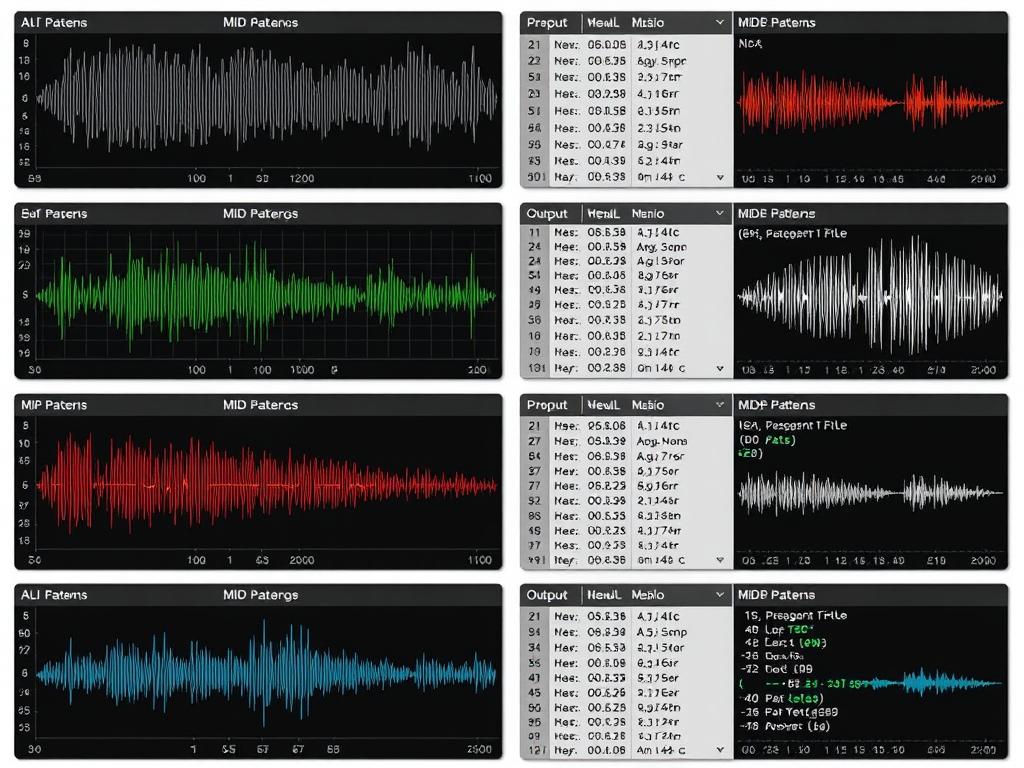
Ready to experience AI music generation?
Discover how these innovative tools can transform your creative process, whether you’re a professional musician or complete beginner.
Key Benefits of AI Music Generators
The rapid adoption of AI music generators across various industries isn’t just a technological trend—it’s a response to the significant advantages these tools offer to creators of all kinds.
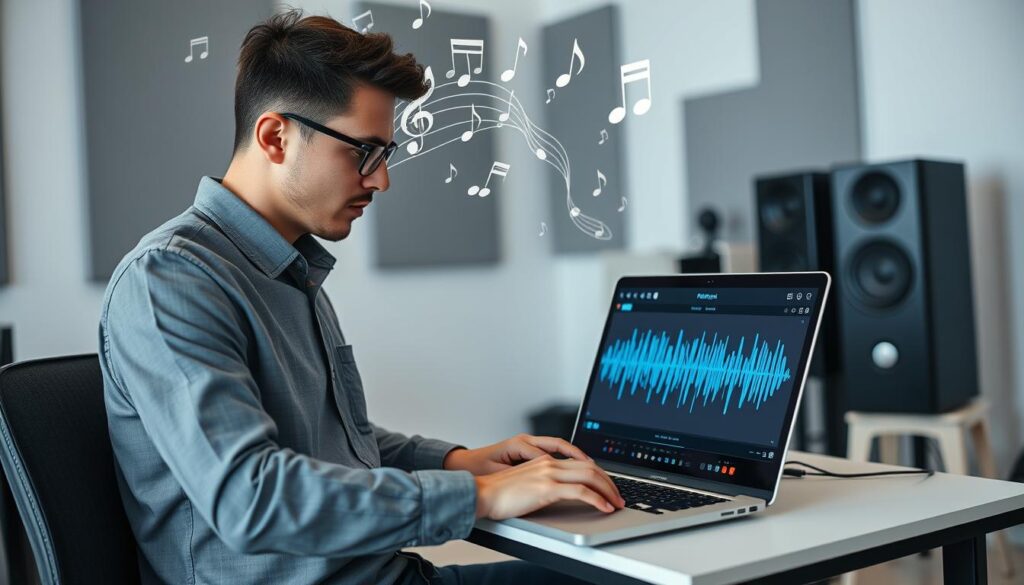
Democratizing Music Creation
Perhaps the most revolutionary aspect of AI music generators is how they’ve made music creation accessible to everyone, regardless of musical background or technical skills.
No Musical Training Required
With AI music generators, you don’t need to understand music theory, play an instrument, or have experience with complex production software. Simply describe what you want—the mood, style, or genre—and the AI creates a complete composition that matches your vision.
Instant Results
What would typically take hours or days of composition and production can now be accomplished in minutes. This rapid creation process allows for quick experimentation and iteration, making music production more accessible and less time-consuming.

Enhancing Workflow for Professionals
Professional musicians and producers are finding that AI music generators can significantly improve their creative process and productivity.
Overcoming Creative Blocks
When inspiration runs dry, AI generators can provide fresh ideas and starting points. Professionals can generate multiple variations of a musical concept and build upon the most promising ones.
Streamlining Production
AI tools can handle time-consuming aspects of music production, such as creating backing tracks or generating harmonies, allowing professionals to focus on refining and adding their unique touch to the composition.
Expanding Creative Possibilities
AI music generators enable professionals to explore styles and techniques outside their comfort zone, potentially leading to innovative hybrid genres and fresh creative directions.
Experimental Sound Design
AI music generators excel at creating unique and experimental sounds that might be difficult to achieve through traditional methods.
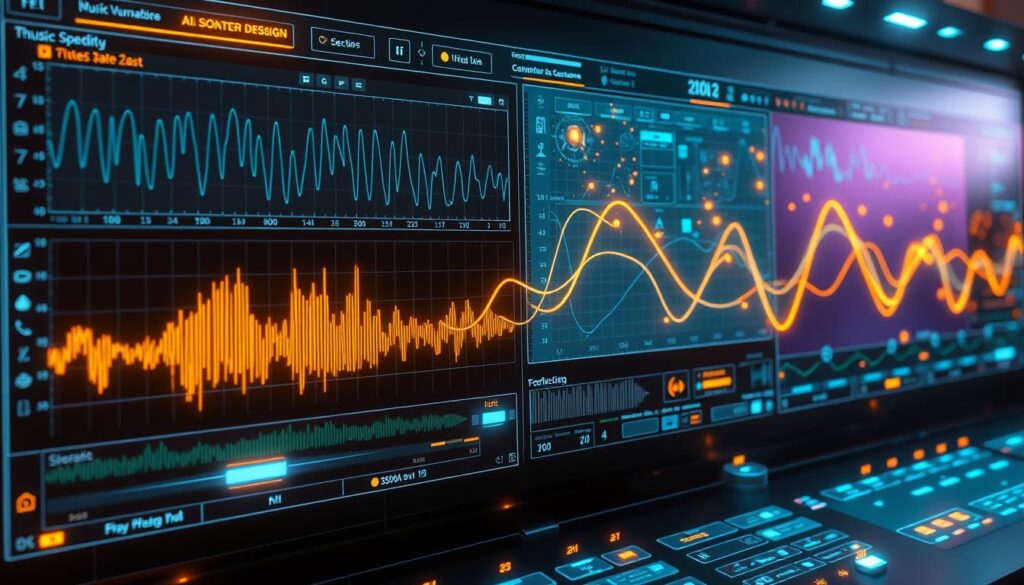
Transform your creative process
Whether you’re a professional musician or complete beginner, AI music generators can help you create original music faster and more efficiently than ever before.
Top 5 AI Music Generator Tools
The market for AI music generators has exploded in recent years, with numerous tools offering various features and capabilities. Here’s a look at five leading platforms that are reshaping how we create music.
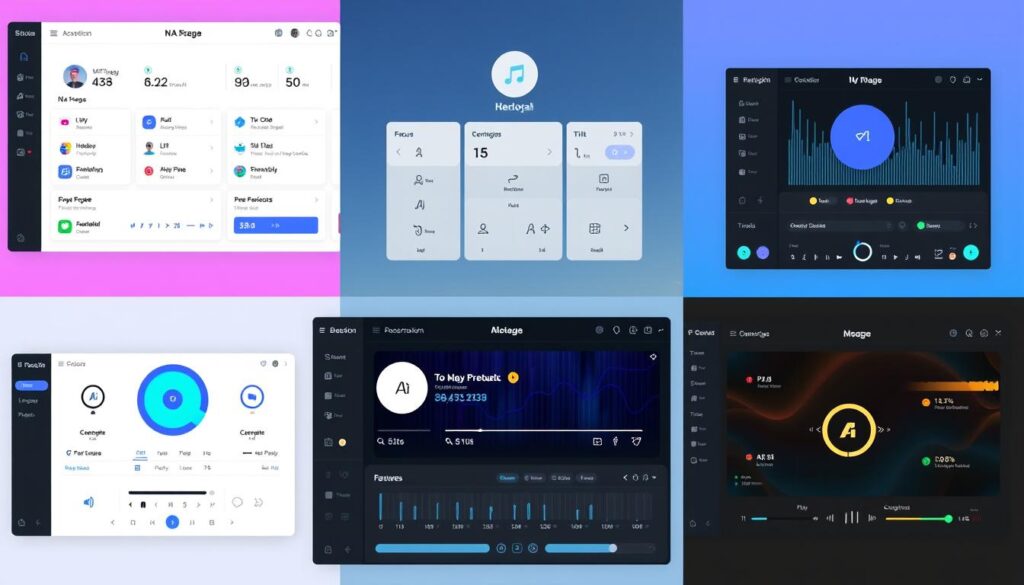
| Tool | Best For | Pricing | Supported Genres | Export Formats |
| AIVA | Professional composers and filmmakers | Free plan, Pro from $15/month | Classical, Electronic, Jazz, Pop | MP3, WAV, MIDI |
| Amper Music | Content creators and marketers | Custom pricing for businesses | Multiple contemporary styles | MP3, WAV |
| Soundraw | YouTubers and social media creators | $16.99/month | Pop, Hip Hop, Lo-Fi, Electronic | MP3, WAV |
1. AIVA (Artificial Intelligence Virtual Artist)
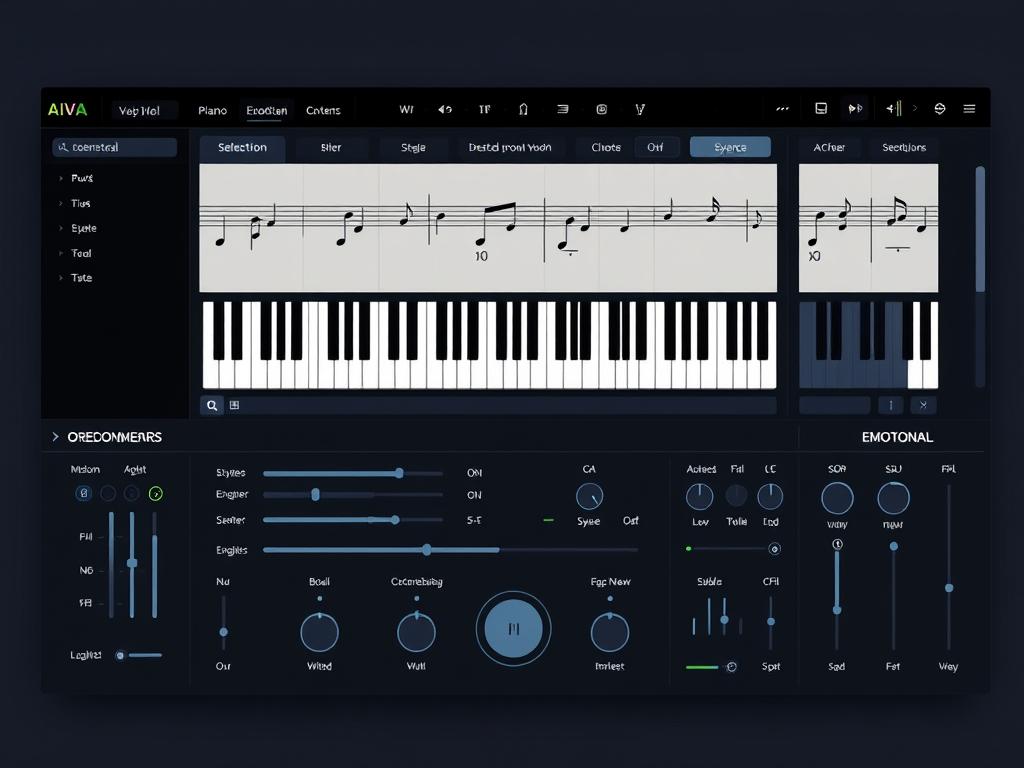
AIVA specializes in creating emotional soundtrack music using deep learning algorithms trained on classical compositions. It’s particularly popular among filmmakers, game developers, and composers seeking orchestral arrangements.
Perfect for creating emotional soundtracks for films, games, and media projects.
2. Amper Music
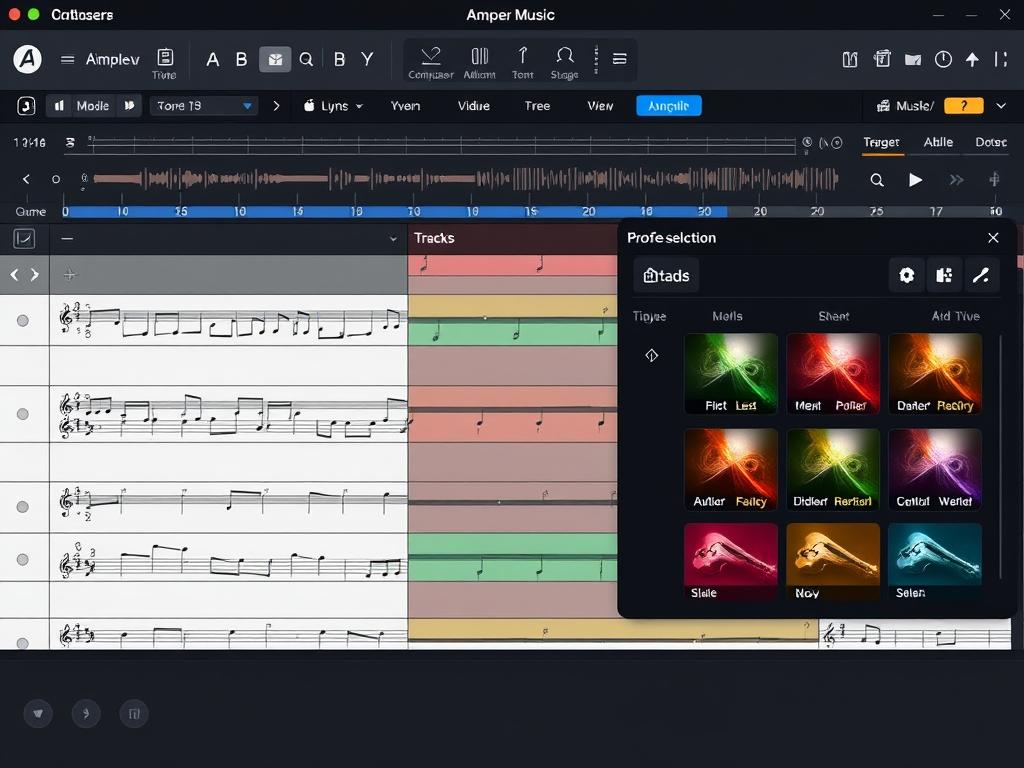
Amper Music focuses on providing AI-generated music for content creators and businesses. Their platform allows users to create custom tracks by selecting mood, genre, and duration parameters.
Ideal for businesses needing consistent, high-quality music for marketing and content.
3. Soundraw
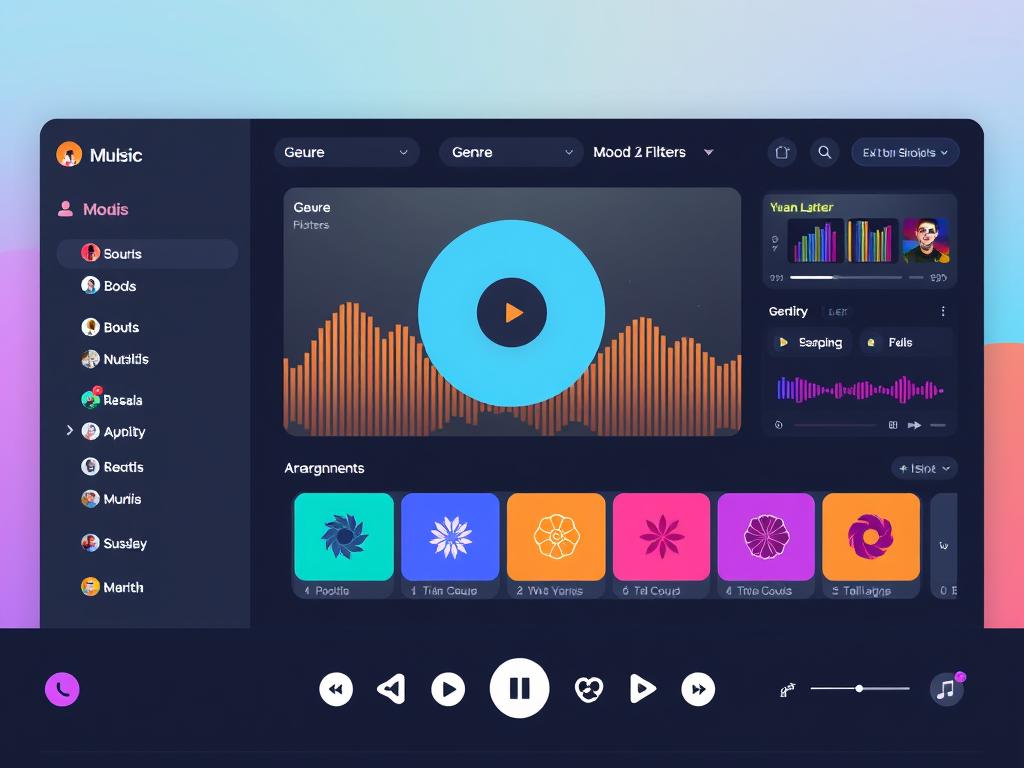
Soundraw generates royalty-free music tracks based on mood, genre, and length specifications. It’s particularly popular among YouTubers and content creators who need background music quickly.
Perfect for content creators needing quick, high-quality background music.
4. Mubert
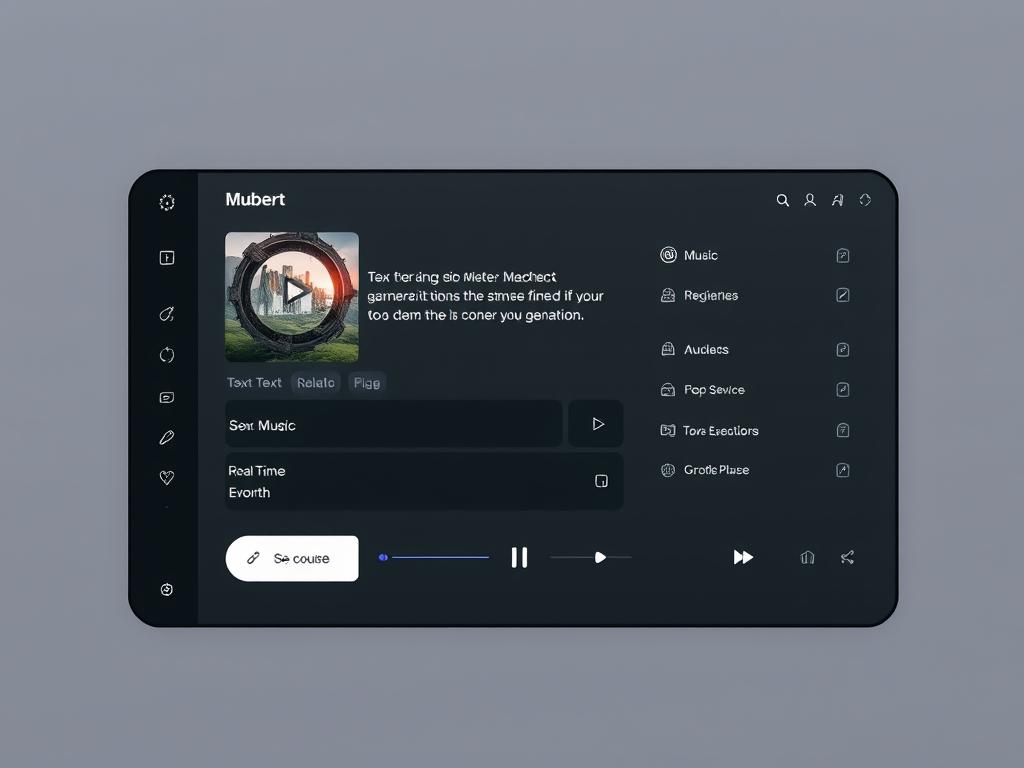
Mubert uses AI to generate endless streams of music based on text prompts or selected moods. It specializes in creating ambient and electronic music for various applications.
Great for apps, websites, and spaces needing continuous background music.
5. Boomy
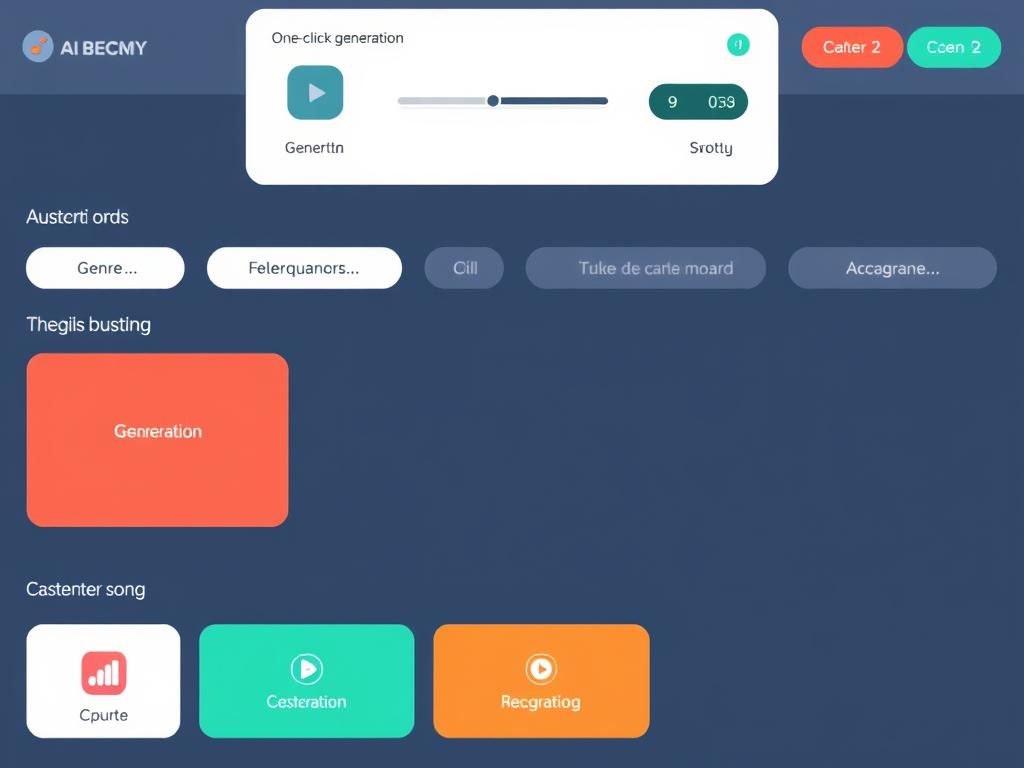
Boomy focuses on simplicity, allowing users to create songs in seconds with minimal input. It’s designed for those with no musical background who want to create and even publish their music.
Ideal for beginners wanting to create and publish their own music without technical knowledge.
Ethical Challenges in AI Music Generation
As AI music generators become more sophisticated and widespread, they raise important ethical questions about creativity, ownership, and the future of human musicians.
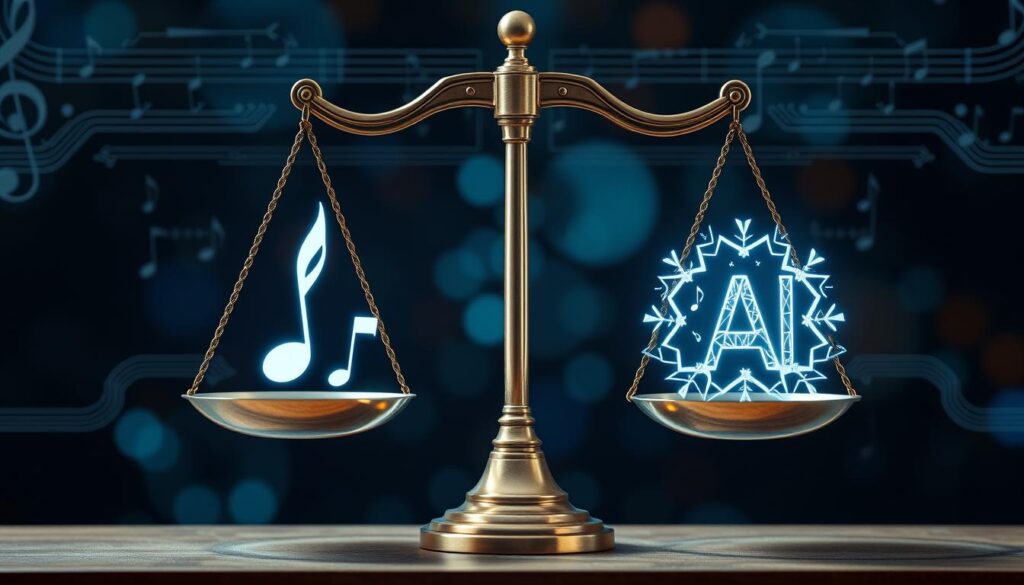
Copyright Implications
The relationship between AI-generated music and copyright law remains complex and evolving. Several key issues are currently being debated in legal and creative communities:
Training Data Concerns
AI music generators learn from existing music, raising questions about whether this constitutes fair use or potential copyright infringement. The legality often depends on how the training data was obtained and how similar the output is to specific copyrighted works.
Ownership of AI Creations
Who owns music created by AI? Is it the developer of the AI system, the user who provided the prompt, or is it effectively in the public domain? Different jurisdictions are approaching these questions in various ways, creating a patchwork of regulations.
“As AI music generation becomes more mainstream, we need thoughtful frameworks that protect human creativity while allowing technological innovation to flourish.”
Artist Displacement Concerns
The increasing capabilities of AI music generators have raised concerns about their impact on human musicians and composers.
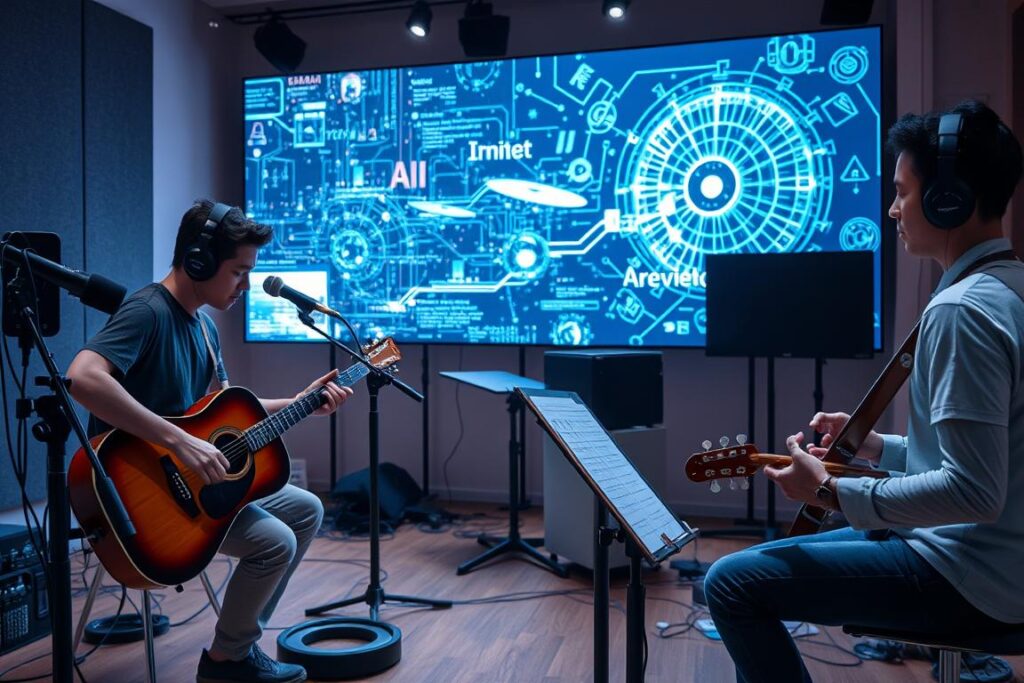
Potential Benefits
- AI tools can augment human creativity rather than replace it
- Democratization of music creation opens new opportunities
- Time-saving for routine aspects of composition
- New hybrid roles emerging for musicians working with AI
Legitimate Concerns
- Reduced demand for session musicians and composers
- Devaluation of musical skills and training
- Economic impact on working musicians
- Loss of human expression and emotional depth
The music industry is still adapting to these changes, with many professionals finding ways to incorporate AI tools into their workflow rather than competing against them. The most likely outcome is a hybrid approach where AI handles certain aspects of music creation while humans provide direction, refinement, and emotional nuance.
Navigate the ethical landscape of AI music
Stay informed about the evolving legal and ethical considerations surrounding AI-generated music.
Future Trends in AI Music Generation
The field of AI music generation is evolving rapidly, with several exciting trends emerging that will shape how we create and experience music in the coming years.
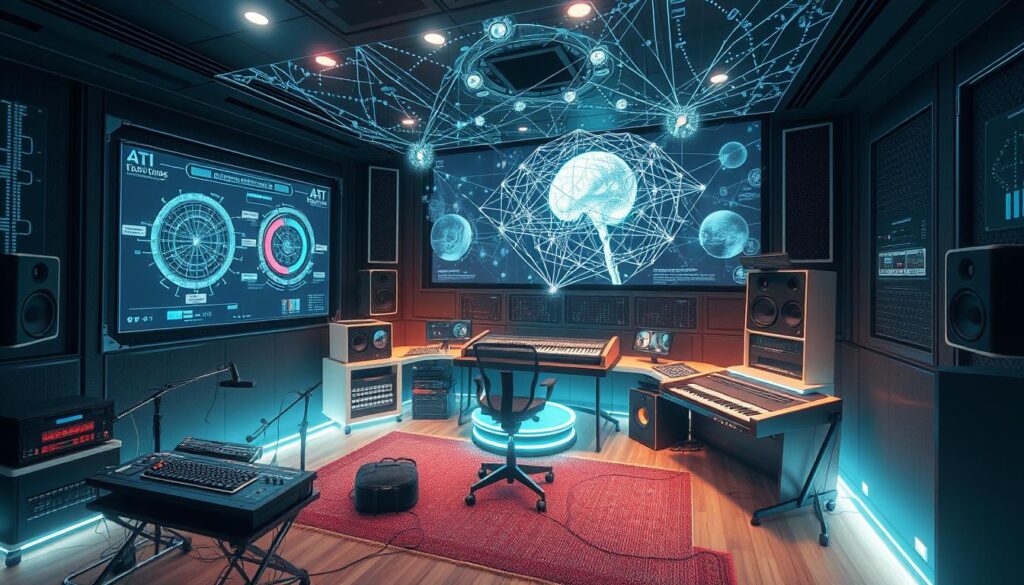
Hybrid Human-AI Collaboration
The future of music creation likely lies not in AI replacing human musicians, but in powerful collaborative approaches that combine the strengths of both.
Co-Creative Tools
Advanced AI music generators are increasingly designed as co-creative partners that can respond to human input in real-time, suggest variations, and learn from the musician’s preferences and style.
Augmented Composition
AI systems that can analyze a composer’s body of work and suggest complementary ideas or extensions while maintaining their unique style and creative voice.
Live Performance Enhancement
AI tools that can accompany live musicians, responding dynamically to their playing and improvising alongside them to create richer, more complex performances.
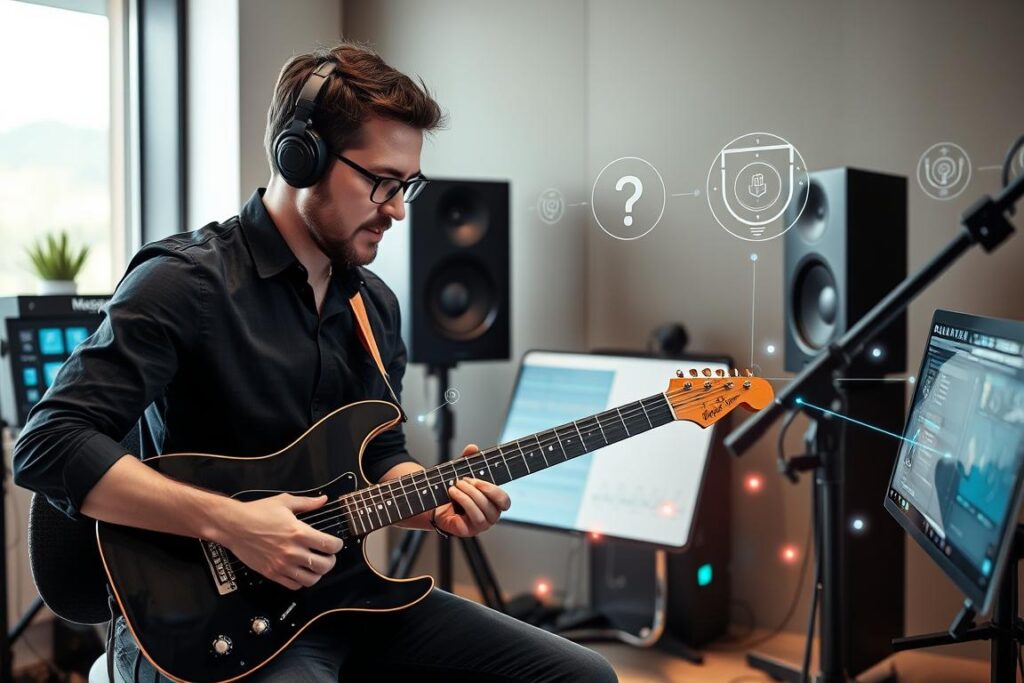
Personalized Soundtracks for Media
One of the most promising applications of AI music generation is the creation of adaptive, personalized soundtracks that respond to content, context, or user preferences.
Advances in Voice Synthesis and Vocal Generation
AI voice technology is rapidly improving, with significant implications for music creation.
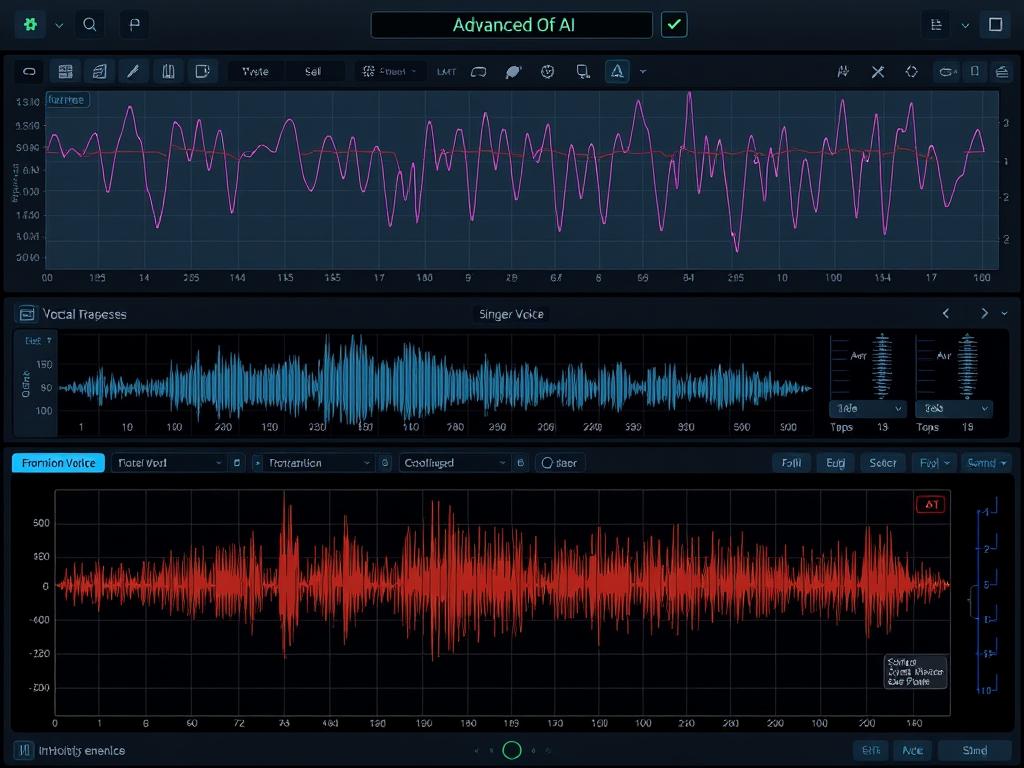
Recent breakthroughs in neural voice synthesis are enabling AI music generators to create increasingly realistic vocal performances. This technology allows for the generation of original vocal melodies and lyrics, voice cloning for stylistic purposes, and even the creation of “vocal instruments” with unique timbral qualities.
While these advances raise important ethical questions about voice rights and authenticity, they also open up exciting creative possibilities for producers and artists who can now experiment with vocal textures and expressions that would be impossible to achieve otherwise.
Stay ahead of the curve
The world of AI music generation is evolving rapidly. Keep up with the latest developments and be among the first to explore new creative possibilities.
Conclusion: Embracing the AI Music Revolution
AI music generators represent a significant shift in how we approach music creation, offering unprecedented accessibility, efficiency, and creative possibilities. As these technologies continue to evolve, they promise to further democratize music production while opening new avenues for artistic expression.
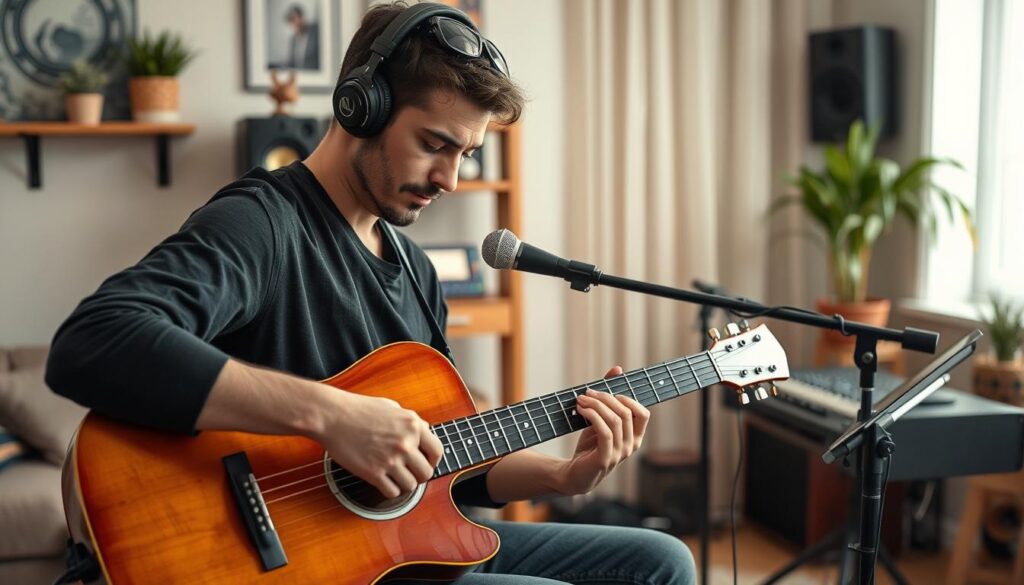
Actionable Advice for Getting Started
Whether you’re a professional musician looking to enhance your workflow, a content creator in need of original soundtracks, or someone who has always wanted to make music but lacked the technical skills, AI music generators offer exciting possibilities. The technology is still evolving, but it’s already transforming how we create, experience, and think about music in the digital age.
As with any powerful creative tool, the most important factor remains the human vision guiding it. AI music generators don’t replace human creativity—they amplify it, making the art of music creation more accessible and versatile than ever before.
Ready to create your own music with AI?
Explore the tools mentioned in this article and start your journey into AI-assisted music creation today.

